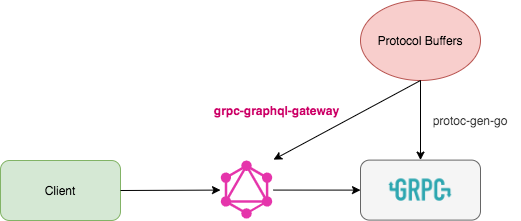
Research
/Security News
DuckDB npm Account Compromised in Continuing Supply Chain Attack
Ongoing npm supply chain attack spreads to DuckDB: multiple packages compromised with the same wallet-drainer malware.
github.com/ysugimoto/grpc-graphql-gateway
grpc-graphql-gateway is a protoc plugin that generates graphql execution code from Protocol Buffers.

On API development, frequently we choose some IDL, in order to manage API definitions from a file. Considering two of IDL -- GraphQL and Protocol Buffers (for gRPC) -- these have positive point respectively:
But sometimes it's hard to maintain both GraphQL and Protocol Buffers, so we created this plugin in order to generate GraphQL Schema from Protocol Buffers.
This project much refers to grpc-gateway how to generate a file, provide a plugin. many thanks!
Get protoc-gen-graphql binary from releases page and set $PATH to be executable.
Or, simply get the latest one:
go get github.com/ysugimoto/grpc-graphql-gateway/protoc-gen-graphql/...
Then the binary will place in $GOBIN.
Get include/graphql.proto from this repository and put it into your project under the protobuf files.
git submodule add https://github.com/ysugimoto/grpc-graphql-gateway.git grpc-graphql-gateway
## Or another way...
Please replace [your/project] section to your appropriate project.
Declare gRPC service with protobuf using grpc-graphql-gateway options.
This example has two RPCs that names SayHello and SayGoodbye:
// greeter.proto
syntax = "proto3";
import "graphql.proto";
service Greeter {
// gRPC service information
option (graphql.service) = {
host: "localhost:50051"
insecure: true
};
rpc SayHello (HelloRequest) returns (HelloReply) {
// Here is plugin definition
option (graphql.schema) = {
type: QUERY // declare as Query
name: "hello" // query name
};
}
rpc SayGoodbye (GoodbyeRequest) returns (GoodbyeReply) {
// Here is plugin definition
option (graphql.schema) = {
type: QUERY // declare as Query
name: "goodbye" // query name
};
}
rpc StreamGreetings (HelloRequest) returns (stream HelloReply) {
option (graphql.schema) = {
type: SUBSCRIPTION;
name: "streamHello";
};
}
}
message HelloRequest {
// Below line means the "name" field is required in GraphQL argument
string name = 1 [(graphql.field) = {required: true}];
}
message HelloReply {
string message = 1;
}
message GoodbyeRequest {
// Below line means the "name" field is required in GraphQL argument
string name = 1 [(graphql.field) = {required: true}];
}
message GoodbyeReply {
string message = 1;
}
Compile protobuf file with the plugin:
protoc \
-I. \
--go_out=./greeter \
--go-grpc_out=./greeter \
--graphql_out=./greeter \
greeter.proto
Then you can see greeter/greeter.pb.go and greeter/greeter.graphql.go.
For example, gRPC service will be:
// service/main.go
package main
import (
"context"
"fmt"
"net"
"log"
"github.com/[your/project]/greeter"
"google.golang.org/grpc"
)
type Server struct{}
func (s *Server) SayHello(ctx context.Context, req *greeter.HelloRequest) (*greeter.HelloReply, error) {
return &greeter.HelloReply{
Message: fmt.Sprintf("Hello, %s!", req.GetName()),
}, nil
}
func (s *Server) SayGoodbye(ctx context.Context, req *greeter.GoodbyeRequest) (*greeter.GoodbyeReply, error) {
return &greeter.GoodbyeReply{
Message: fmt.Sprintf("Good-bye, %s!", req.GetName()),
}, nil
}
func (s *Server) StreamGreetings(req *greeter.HelloRequest, stream greeter.Greeter_StreamGreetingsServer) error {
// Get the name from the request
name := req.GetName()
if name == "" {
return status.Error(codes.InvalidArgument, "name cannot be empty")
}
// Define a list of greeting messages to send
greetings := []string{
fmt.Sprintf("Hello, %s!", name),
fmt.Sprintf("Greetings, %s!", name),
fmt.Sprintf("Good day, %s!", name),
fmt.Sprintf("Welcome, %s!", name),
fmt.Sprintf("Hi there, %s!", name),
}
// Stream each greeting to the client
for _, greeting := range greetings {
// Create the response message
reply := &greeter.HelloReply{
Message: greeting,
}
// Send the message to the client
if err := stream.Send(reply); err != nil {
return status.Errorf(codes.Internal, "failed to send greeting: %v", err)
}
// Add a small delay between messages (optional)
time.Sleep(time.Millisecond * 200)
}
return nil
}
func main() {
conn, err := net.Listen("tcp", ":50051")
if err != nil {
log.Fatal(err)
}
defer conn.Close()
server := grpc.NewServer()
greeter.RegisterGreeterServer(server, &Server{})
server.Serve(conn)
}
Then let's start service:
go run service/main.go
The gRPC service will start on localhost:50051.
Next, GraphQL gateway service should be:
// gateway/main.go
package main
import (
"log"
"net/http"
"github.com/[your/project]/greeter"
"github.com/ysugimoto/grpc-graphql-gateway/runtime"
)
func main() {
mux := runtime.NewServeMux()
if err := greeter.RegisterGreeterGraphql(mux); err != nil {
log.Fatalln(err)
}
http.Handle("/graphql", mux)
log.Fatalln(http.ListenAndServe(":8888", nil))
}
Then let's start gateway:
go run gateway/main.go
The GraphQL gateway will start on localhost:8888
Now you can access gRPC service via GraphQL gateway!
curl -g "http://localhost:8888/graphql" -d '
{
hello(name: "GraphQL Gateway") {
message
}
}'
#=> {"data":{"hello":{"message":"Hello, GraphQL Gateway!"}}}
You can also send request via POST method with operation name like:
curl -XPOST "http://localhost:8888/graphql" -d '
query greeting($name: String = "GraphQL Gateway") {
hello(name: $name) {
message
}
goodbye(name: $name) {
message
}
}'
#=> {"data":{"goodbye":{"message":"Good-bye, GraphQL Gateway!"},"hello":{"message":"Hello, GraphQL Gateway!"}}}
You can send subscription
wscat -c ws://localhost:8888/graphql -s graphql-ws
{"id":"1","type":"subscribe","payload":{"query":"subscription($name:String!){ streamHello(name:$name){ message }}","variables":{"name":"Kamil"}}}
#=> {"payload":{"data":{"streamHello":{"message":"Hello, Kamil!"}}},"id":"1","type":"data"}
#=> {"payload":{"data":{"streamHello":{"message":"Greetings, Kamil!"}}},"id":"1","type":"data"}
#=> {"payload":{"data":{"streamHello":{"message":"Good day, Kamil!"}}},"id":"1","type":"data"}
#=> {"payload":{"data":{"streamHello":{"message":"Welcome, Kamil!"}}},"id":"1","type":"data"}
#=> {"payload":{"data":{"streamHello":{"message":"Hi there, Kamil!"}}},"id":"1","type":"data"}
#=> {"id":"1","type":"complete"}
This is the most simplest way :-)
To learn more, please see the following resources:
graphql.proto Plugin option definition. See a comment section for custom usage (e.g mutation).This plugin generates graphql execution code using graphql-go/graphql, see that repository in detail.
This plugin just aims to generate a simple gateway of gRPC.
Some of things could be solved and could not be solved. The most of limitations come from the IDL's power of expression -- some kind of GraphQL schema feature cannot implement by Protocol Buffers X(
Currently we don't support some Protobuf types:
oneof typeYoshiaki Sugimoto
MIT
FAQs
Unknown package
Did you know?

Socket for GitHub automatically highlights issues in each pull request and monitors the health of all your open source dependencies. Discover the contents of your packages and block harmful activity before you install or update your dependencies.

Research
/Security News
Ongoing npm supply chain attack spreads to DuckDB: multiple packages compromised with the same wallet-drainer malware.

Security News
The MCP Steering Committee has launched the official MCP Registry in preview, a central hub for discovering and publishing MCP servers.

Product
Socket’s new Pull Request Stories give security teams clear visibility into dependency risks and outcomes across scanned pull requests.